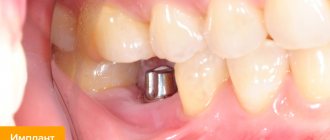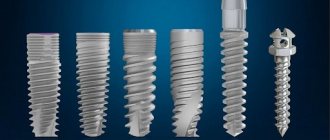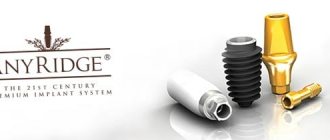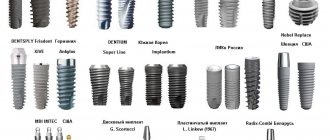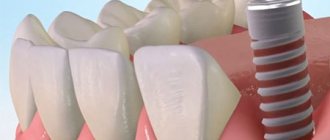Modern dentistry is undoubtedly the latest generation of implantation. Science and technology in this area are ahead of their time; the development of implantology can be compared to space developments. Continuous study of a huge number of clinical cases, analysis of results, implementation of innovative solutions, improvement of materials and types of implants has already made it so that modern dental implantation is completely painless, safe and allows you to restore an entire row of teeth even in one visit.
Modern dental implantation
Dental restoration using implants began in the mid-twentieth century. The metal rod installed in the jawbone has changed over time, and new methods of its installation have appeared. Outdated plate implants are no longer used. Doctors have moved away from the intramucosal, superiosteal method and some others. Nowadays, new generation dental implants are artificial roots made of titanium alloy, which are biocompatible with the human body, do not cause allergic reactions, are durable and reliable for chewing loads. They play the role of real roots, preventing the atrophy of bone tissue that would inevitably occur in the place of lost teeth. And new implantation protocols make it possible to quickly solve the problem of the absence of one or all teeth, without preparing healthy teeth and even avoiding sinus lifting and increasing the volume of bone tissue in case of its deficiency.
Dental restoration forever!
Installation of a two-stage implant ROOTT (Switzerland) - RUB 27,000. 32,000 rub.
The best budget systems
There is no need to perceive the phrase “budget implants” in a negative way. If we talk about Israeli and Korean systems, which are leaders in this segment, many experts note that they may well be an alternative to top-end systems. These manufacturers produce good and fairly reliable lines of implants, but at the same time they do not have such a variety of solutions for installation and prosthetics (especially in complex cases). On the other hand, many budget systems are more than 2 times cheaper than elite implants, which cannot but attract patients.
Alpha Bio (Israel)
| Survival rate | Prosthetics | Engraftment time | Indications for installation | Affordability |
| About 99.6% (8 points) | 6 points | 7 points | 7 points | 10 points |
Osstem (South Korea)
| Survival rate | Prosthetics | Engraftment time | Indications for installation | Affordability |
| About 99.2% (8 points) | 7 points | 7 points | 6 points | 10 points |
Dentium (South Korea)
| Survival rate | Prosthetics | Engraftment time | Indications for installation | Affordability |
| About 98% (8 points) | 7 points | 7 points | 6 points | 10 points |
MIS (Israel)
| Survival rate | Prosthetics | Engraftment time | Indications for installation | Affordability |
| About 97% (8 points) | 6 points | 7 points | 6 points | 10 points |
Modern methods of dental implantation
The dental clinic can offer the patient atraumatic, fast and effective modern implantation methods.
Express implantation
(simultaneous implantation). The method of implanting a titanium pin directly into the socket of an extracted tooth is used. Advantages of the one-stage flapless method:
- there is no need to cut the tissue, suturing it, which means less time will be spent on healing and removal of sutures;
- the non-traumatic nature of the operation, which is morally easier for a person to bear;
- installation lasts up to 15 minutes.
In what cases is this transgingival method of modern dental implantation suitable:
- in the absence of one or all teeth on the upper or lower jaw;
- There is a time limit for recovery (it must be done urgently).
In addition, there should not be severe inflammation of the gums and insufficient bone tissue (consultation with a doctor is necessary to resolve these issues).
Implantation with immediate loading
(one-stage implantation). Just a couple of decades ago, after implantation, it was necessary to walk without a visible tooth, without a crown or prosthesis, for the entire period of osseointegration (3-6 months). Which, naturally, caused terrible psychological discomfort in any patient. The latest generation of implantations allows you to immediately install an adaptive prosthesis. A person leaving the dentist's office can smile, speak without defects and eat normally. During the entire period of engraftment of the titanium pin, its fusion with tissues and blood vessels, a lightweight temporary prosthesis allows you to get used to the presence of the orthopedic structure in the mouth and not experience discomfort in everyday life.
Get a consultation
We will answer all your questions before visiting the clinic!
+7
Online registration
Healing period for the best implants
On average, the time for osseointegration of dental implants using the traditional method is close to 6 months. However, today many manufacturers are introducing the latest developments, due to which they can reduce this period to 4-8 weeks.
Some patients consider this point to be the most important when searching for an answer to the question: “Which are the best dental implants?”
Indications for implantation
Most companies offer implantation systems that can be used in one-stage and two-stage techniques. The possibility of implant fixation in case of hepatitis, diabetes mellitus and insufficient bone tissue is already the prerogative of top brands. Not all manufacturers use technologies that allow the installation of dental implants in the presence of serious restrictions. However, if you are wondering which dental implant is better, this is a point you should pay attention to. High-quality systems produced by prestigious companies are usually allowed for fixation if there are contraindications.
Indications:
- absence of one, several teeth or complete edentia.
Dental implantation using a surgical template
. The use of 3D modeling helps the doctor accurately plan the operation, eliminating all risks and undesirable consequences. The modern method of implantation using a surgical template is the key to the successful work of an implantologist and orthopedist.
After a CT (computed tomography) scan, the doctor outlines the location of the implants in the program, which he then works with to decide at what angle and what type of implant to install. And the technician is already preparing to make temporary crowns and prostheses, which will be fixed on the day of implantation.
Our team of doctors
Maxillofacial surgeon, Implantologist
Bocharov Maxim Viktorovich
Experience: 11 years
Dental surgeon, Implantologist
Chernov Dmitry Anatolievich
Experience: 29 years
Orthopedist, Neuromuscular dentist
Stepanov Andrey Vasilievich
Experience: 22 years
Endodontist, Therapist
Skalet Yana Alexandrovna
Experience: 22 years
Orthopedic dentist
Tsoi Sergey Konstantinovich
Experience: 19 years
Dentist-orthodontist
Enikeeva Anna Stanislavovna
Experience: 3 years
Indications:
- absence of several teeth or complete edentia;
- a complex clinical case that requires a particularly careful approach.
Implantation
All-on-4 and All-on-6
. Modern dental implantation “All on four” or “All on six” allows you to reduce the financial burden of restoring the entire dentition. By implanting only 4 or 6 titanium rods, you can install a complete denture on the jaw with 10-12 artificial crowns. Installing an implant instead of each tooth would require more money and time.
Hi-Tec implants
Hi Tec Implants is one of the leading Israeli companies that has been producing a wide range of implants for over 20 years. During this period, the company has established itself as a representative of quality materials at an affordable price .
Advantages and features:
- A wide selection of types of structures, which allows you to choose the optimal one for each specific clinical situation;
- The implants are made of the highest quality titanium;
- Simple surgical protocol (operation progress);
- Having our own full-cycle production allows us to ensure a high level of quality control of dental implants (implants) and a reasonable cost.
Thus, this implantation system combines high quality and reasonable cost. Among mid-level implants, Hi-Tec takes first place.
Indications:
- absence of most teeth or complete edentia;
- inability to wear a removable lamellar denture.
This modern implantation method allows people with removable dentures to securely fix it.
Complex implantation
. “All inclusive” in dental treatment. In one visit to the dentist, teeth are removed (if necessary) and an implant is inserted. A method for immediately restoring multiple teeth. Prosthetics on 6-12 implants with a fixed prosthesis.
Combined
The shape and size of such implants are determined strictly individually, depending on the number of lost teeth, the thickness of the jaw bone and other factors.
Highlight:
- Lamellar-root-shaped;
- Disc: for weak, atrophied bone in cases where bone grafting is impossible;
- Transosseous: used for severe atrophy of the jaw bone, installed through an incision in the chin area;
- Ramus-frame dental implants: a fairly extensive design that covers almost the entire jaw. It is used for severe bone atrophy and serves as a support for both removable and fixed prostheses.
Such implants are used only in cases where screw installation is not possible. The operation requires more time, the process is complex and traumatic . The recovery period is much longer, and the service life is short.
Indications:
- impossibility of two-stage implantation;
- absence of 3 teeth to complete absence;
- urgency of recovery.
Resmile
. Implantation technology without cuts or sutures. The transgingival method of implanting a titanium root is atraumatic, healing occurs quickly. The combination of implants from one system increases the success rate and minimizes complications. This is facilitated by a titanium-based ceramic composite prosthesis, which is installed on the 4th day and does not require replacement subsequently; it is permanent.
What trends are expected in this area?
Unlike dentures, implants do not need to be periodically replaced with new ones . They help make your smile beautiful, natural and healthy at any age. However, their main advantage is the complete restoration of dental functions.
Nowadays there are dental structures made of different materials: titanium alloy, ceramics, biopolymer. Technology improvements continue. Thus, Spanish scientists have created completely new dental implants with a biodegradable coating. They integrate much faster into living tissues; upon contact, the coating particles gradually dissolve. This helps accelerate bone regeneration.
New generation of dental implants
Implant manufacturers are constantly researching and developing new types of dental implants. By studying numerous clinical pictures from the practice of doctors, they create new types of threads, improve the alloy, and change the method of processing the surface of the product.
New generation dental implants:
- Compression implants. The very tight contact of titanium and tissue promotes rapid osseointegration.
- Multi-units with a rotating abutment head, screw fastening for fixing the prosthesis with screw fixation.
- Basal implants are placed where there is critically little bone tissue. Their implantation occurs in deeper, dense layers.
The titanium alloy is being improved, and the grinding and processing of the implant surface takes place in several stages. This is sandblasting and etching. The main thing is to achieve the necessary roughness of the root part of the implant for successful survival and cleanliness, the absence of traces of organic matter during production. The necks are made smooth to prevent the accumulation and reproduction of bacteria on them. Every nuance is taken into account. And the creation of a wide range of implants allows the doctor to comprehensively use different types of artificial roots within one operation.
Modern systems have a warranty of 25-50 years, and many manufacturers provide a lifetime warranty. The survival rate of implants takes from three months to six months, and the success of osseointegration of new generation dental implants reaches 98.5%.
Designs with tapered abutment connection
Another improvement in the field of implantology is the development of a monolithic (non-removable) implant with a conical abutment. The cone ligament rationally distributes the load and provides the best mechanical stability of the artificial root. Thus, it became possible to insert the structure below the level of the cortical bone, which has poor blood circulation.
Advantages of the technology:
- integrity of the structure;
- uniform load distribution;
- impossibility of penetration of pathogenic microorganisms;
- fusion of tissues with implant coating;
- maintaining normal blood circulation of structures;
- excellent aesthetic appearance;
- long service life.
Alternative Methods
You can restore the integrity of the dentition using:
- removable prosthetics. It is inexpensive and can immediately replace all lost teeth. But it takes a long time to get used to such voluminous structures; at first they can cause a gag reflex. For more reliable fixation, additional means such as Corega are often used to prevent the prosthesis from accidentally falling out. Aesthetics are poor, and tissue atrophy progresses inexorably. With prosthetics on implants this is impossible.
- prosthetics with a bridge supported by adjacent teeth. In this case, the supporting teeth grind down and become weaker. With constant chewing load, such structures may collapse over time.
- crowns If the tooth root is preserved, it can be restored with a crown. If the root is destroyed, then the only options left are single implantation or a bridge;
- classical implantation. A two-stage protocol involves installing a root-shaped implant, waiting for it to engraft into the bone, and only then fixing the permanent prosthesis. This is a long process (from 3 to 6 months), during which the titanium rod is completely osseointegrated into the jaw bone.
Advantages and features:
- Each implant is covered with a unique TiUnit material, thanks to which the process of osseointegration occurs much faster (in its structure and composition it is very close to bone tissue);
- 3D planning of the operation, which is the key to the accuracy and high aesthetics of the finished structure;
- Due to the design features of the thread and the body of the implants themselves, tissue trauma is minimal;
- A wide range of implants in diameter and length makes it possible to install them even in the most seemingly difficult clinical situations;
- Simplicity, logic and accuracy in the surgical protocol (operation);
- All Nobel implants have identification numbers. Fake is impossible.
The only downside worth noting is the high cost.
Price
Modern dental implantation is more expensive than prosthetics. The cost of treatment depends on several factors:
- chosen method;
- use of a surgical template;
- number of implants;
- company manufacturer;
- material of prosthesis, crown;
- qualification of an implantologist.
For example, the price of one-stage implantation with a temporary crown is about 40,000 rubles, the All-on-4 technology of one jaw with an adaptive prosthesis will cost from 190,000 rubles, one-stage implantation with complete edentia of one jaw on 6 compression implants and a temporary prosthesis - in the region RUB 265,000 The cost item may increase due to additional diagnostics and prosthetic materials.
Prosthetics prospects
Completion of osseointegration is not the end of the process. Now you need to put the prosthesis on the artificial root. It can be single (crown), bridge or full jaw. Comfort when chewing, diction, and aesthetics depend on the capabilities of prosthetics. The wider they are, the better for the patient, especially in complex clinical cases. Therefore, dentists say that when choosing an implant, you need to focus not only on the manufacturer, but also on the condition of the patient’s jaw. The question is not whether Korean or German, Swiss or Israeli implants are, but which of them are better suited for a particular case.
Where to go for the latest generation of dental implants
Only dental clinics with technologically advanced diagnostic and surgical equipment and highly qualified staff can offer a choice of modern methods of dental implantation and a guarantee for their work.
The table shows several Moscow clinics where you can restore a beautiful smile in an advanced way. We advise you to find out the cost and current promotions directly on their websites.
| dental clinic | Website |
| Center for Dental Implantology ROOTT (RUTT) | https://dentalroott.ru |
| Dentum dentistry | https://dentumclinic.ru |
| City-Dent | https://city-dent.rf |
| The president | https://www.prezi-dent.ru |
| Center Family Dentistry | https://family-dental.ru |
ASTRA TECH implants
ASTRA TECH implants
The system was developed by Swedish scientists and is popular in many countries.
Advantages and features:
- Made of the highest class titanium, which has excellent biochemical qualities;
- Modified OsseoSpeed surface, which accelerates the process of osseointegration;
- The connection of the implant to the Conical Seal Design abutment is located below the gum level, which allows for a more even distribution of the chewing load;
- Patented microthread in the upper part of the implant (in the neck area), which also improves the distribution of chewing pressure;
- The company provides a lifetime guarantee.
Among the disadvantages, high cost can be noted.
Basal
Such implants are installed in the basal layer of the jaw bone tissue. It is denser than the spongy layer. This ensures good primary stabilization. Prosthetics can be performed 3-5 days after the operation.
The intraosseous part and the abutment are a single unit. Therefore, it is impossible to correct the supragingival part after installing the implant. There are many cases of loss of aesthetics - dentures look unnatural and do not adhere well to the periodontal tissues.
The process of installing basal implants is not very complicated and traumatic, but basal implants have more “cons” than advantages.
Firstly, this is not titanium (after installing this type of implant, the orthopedic doctor simply bends them with forceps, creating parallelism), but it is titanium that has the property of “fusing” with the bone.
Secondly, with Basal implantation, osseointegration does not occur and it is rather the denture that holds the implants in the bone, and not vice versa.
Thus, at first glance, there are more advantages of basal implants, but the disadvantages are so significant that their use is questionable.
